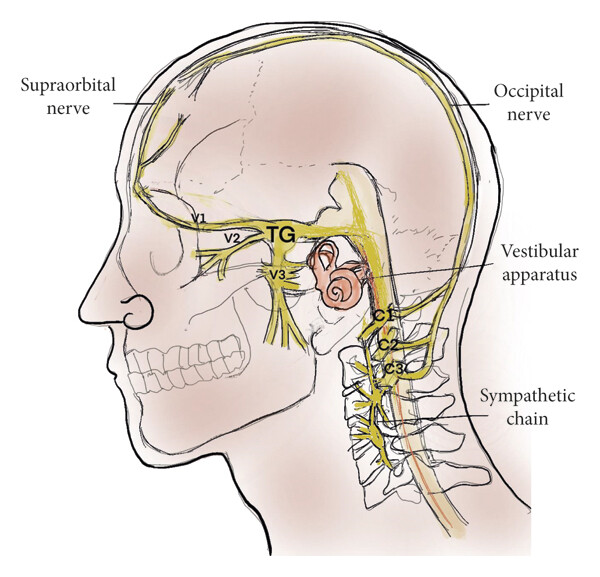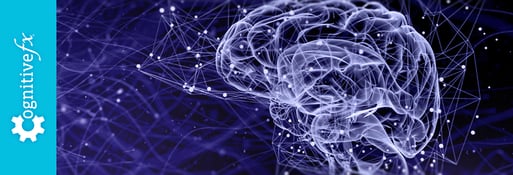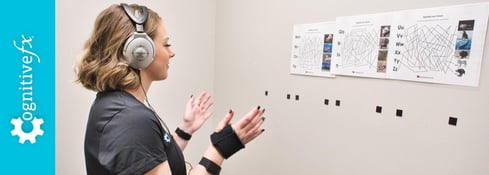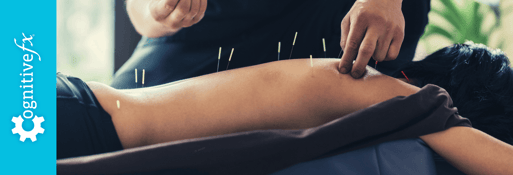Post-Concussion Difficulty Concentrating: Causes & Treatment Options
"I can't focus on anything for more than a few minutes." "I keep reading the same paragraph over and over." "My mind feels like it's covered in fog." "I used to be able to multitask, but now I can barely handle one thing at a time."
These are comments we hear daily from patients with post-concussion concentration problems. Many patients report that their mental fog and focus issues "just feel different" from regular distraction or tiredness. This is because the cause and presentation of post-concussion concentration difficulties are noticeably different from typical attention challenges.
At CognitiveFX, we treat concentration problems as well as many of the other common symptoms of concussion in patients whose issues persist for three months or more (a condition commonly known as post-concussion syndrome). Many of our patients ask the same questions about their focus issues, so we've put together this guide to help you understand:
- What causes difficulty concentrating after a concussion
- The different types of concentration problems you might experience
- How long concentration issues typically last
- What treatment options are available
- What you can do at home to help manage symptoms
Post-concussion concentration difficulties are complicated, and there's still much work to be done in understanding why and how they happen. They don't always respond to simple rest or "brain training" apps; sometimes it takes targeted therapeutic interventions to bring them under control. But treating them is key — difficulty concentrating is one of the most commonly reported symptoms after mild traumatic brain injury. Research shows that concentration and attention are among the neurocognitive domains most susceptible to concussion effects, affecting a significant portion of patients with persistent symptoms.
At Cognitive FX, we focus on treating the underlying cause of concentration problems instead of just managing symptoms. If you're experiencing cognitive symptoms (such as difficulty focusing) that won't resolve after a concussion, you're not alone. 95% of our patients experience statistically verified restoration of brain function. To see if you are eligible for treatment, sign up for a consultation.
Understanding Post-Concussion Concentration Problems
Concentration difficulties can manifest in many forms after a concussion. Above are some examples of the way patients experience focus problems and their potential causes. Patients may experience one, several, or all of these types depending on their situation.
Post-concussion concentration problems can be pretty distinct from "normal" distraction (think being tired, stressed, or having too many tabs open in your mind) and can present in various forms. Research indicates that patients with post-concussion syndrome are more likely to experience cognitive deficits including attention, verbal memory, and executive function, with up to 20% of concussion symptoms persisting longer than 3 months.
In some instances, patients will report experiencing more than one type of focus problem, and they are complex in their presentation, their cause, and their treatment. We'll explore more about their causes and presentation in the sections below.
How Neurovascular Coupling Dysfunction Affects Concentration
Neurovascular coupling (NVC) is the connection between neurons and the blood vessels that supply them with oxygen. During head trauma, your immune system causes inflammation in the affected parts of your brain. Any part of the brain impacted by a concussion can experience a communication breakdown that may or may not be restored after you heal from the initial injury.
Think of the signaling between neurons and blood vessels like road traffic. A healthy brain would distribute "traffic" — i.e., the signaling and blood flow dynamics needed for a task like reading or having a conversation — equally along existing pathways. Neurovascular coupling dysfunction is like getting stuck in a traffic jam or taking a frontage road instead of the highway. It's inefficient and requires more "gas" to get to the same destination. Even when there's no physical brain damage, there's a real change in the brain's ability to function.
Research on NVC dysfunction after traumatic brain injury proposes this as a unifying theory for post-concussion syndrome, explaining how disruptions to neuronally-triggered regional cerebral blood flow account for a significant portion of persistent symptoms. Brain regions impacted by NVC dysfunction either can't call for enough blood flow to complete their tasks or they call for far too much, making it harder for the brain to do its job well. Other neuron clusters in nearby regions have to step in and do the job for them, but it's easy for them to become overloaded.
Why This Matters for Concentration
When your brain has to work harder to accomplish basic tasks, concentration becomes exhausting. Here's what happens:
- Increased Mental Effort: Tasks that used to be automatic now require active focus
- Faster Mental Fatigue: Your brain tires more quickly because it's using more resources
- Reduced Processing Speed: Information takes longer to process and understand
- Difficulty Filtering Distractions: Your brain struggles to ignore irrelevant information
- Problems with Working Memory: Holding multiple pieces of information becomes challenging
The more your brain is affected by NVC dysfunction, the more likely you are to experience concentration problems. Many patients notice that their focus issues get worse the longer they try to concentrate; NVC dysfunction is why. Studies suggest that after moderate to severe TBI, neurovascular "uncoupling" occurs due to alterations in neural control and endothelial function. The good news is that we know how to treat NVC dysfunction, which we'll discuss more in the treatment section of this post.
How Executive Function Disruption Contributes to Focus Problems
The frontal lobe of your brain houses your executive functions — the mental processes that help you plan, organize, make decisions, manage time, and control impulses. Think of executive functions as the "CEO" of your brain, coordinating all the other departments to work together efficiently.
After a concussion, the frontal lobe is particularly vulnerable to NVC dysfunction. Research shows that executive dysfunction may include deficits in reasoning, planning, concept formation, mental flexibility, aspects of attention and awareness, and purposeful behavior, generally attributed to frontal systems dysfunction. When these executive control centers aren't working properly, you might experience:
- Inability to Filter Information: Everything seems equally important, making it hard to focus on what matters
- Task Switching Difficulties: Moving from one activity to another feels mentally exhausting
- Poor Working Memory: You forget what you were doing mid-task or lose your train of thought
- Difficulty Planning: Multi-step tasks feel overwhelming, even simple ones
- Mental Rigidity: You might get "stuck" on one thought or struggle to adapt when plans change
Importantly, loss of attention and focus contributes to a false perception of memory and executive functioning issues when the core problem in most patients is the decrease in concentration ability. The frontal lobe plays a major role in initiation and sustenance of attention, shifting focus, and refocus. These aren't signs of laziness or lack of willpower. They're the result of disrupted communication in specific brain regions responsible for attention and concentration.
How Autonomic Nervous System Dysfunction Impacts Focus
The autonomic nervous system (ANS) controls heart rate, respiration rate, blood pressure, and many of the other bodily functions we don't think about that keep us alive. It has two parts: the sympathetic nervous system (SNS) and the parasympathetic nervous system (PNS). The SNS and PNS regulate your "fight or flight" and "rest and digest" processes, respectively.
Normally, these two are balanced so that we can respond to our environment appropriately. After a head injury, however, the fight or flight system (SNS) may tend to dominate, leading to a variety of common symptoms, such as difficulty concentrating, mental fatigue, exercise intolerance, sleep disturbance, and more.
The Connection Between ANS and Concentration
When your ANS is dysregulated, your body stays in a heightened state of alertness. This creates a cascade of problems for concentration:
- Hypervigilance: Your brain constantly scans for threats, making it nearly impossible to focus on tasks
- Reduced Recovery Time: Your brain doesn't get adequate rest periods to recharge
- Sleep Disruption: Poor sleep quality means your brain can't consolidate memories or restore cognitive resources
- Energy Depletion: Being in "fight or flight" mode constantly drains mental energy reserves
- Increased Anxiety: Worry and stress further tax your cognitive resources
Many patients describe feeling "wired but tired" — simultaneously exhausted and unable to relax or focus. This paradoxical state is a hallmark of ANS dysfunction after a concussion.

Cervicovestibular trigeminosympathetic system: the anatomic and functional connections between the trigeminal, vestibular, cervical, and sympathetic systems which are often involved in postconcussion syndrome. Cervical roots and the trigeminal system run proximal to each other with convergence of their afferents. The vestibulocollic and vestibulospinal tract controls the neck and truck tone. Cervical roots are in close proximity and communicate with the cervical sympathetic chains which are connections to the autonomic nervous system. TG, trigeminal ganglion; C1/2/3, cervical roots. https://onlinelibrary.wiley.com/doi/10.1155/2021/5567695
What Concentration Problems After Concussion Feel Like
Many concussion patients will say that post-concussion concentration problems 'just feel different,' or they 'just know when their brain isn't working right.' The exact feeling can vary from person to person. Let's summarize some common experiences:
Mental Fog or "Brain Fog"
The most common description is a sense of mental cloudiness. Cognitive complaints following mild TBI include brain fog, difficulties with attention and concentration, and memory problems. Thoughts feel slow, unclear, or distant. You might:
- Feel like you're thinking through molasses
- Struggle to find the right words when speaking
- Have trouble following conversations, especially in groups
- Need to re-read text multiple times to understand it
Overwhelm and Cognitive Overload
Tasks that involve multiple steps or pieces of information feel impossible. You might:
- Feel panicked in busy or noisy environments
- Become exhausted after short periods of mental work
- Need to isolate yourself to accomplish simple tasks
- Experience shutdowns where you can't think at all
Attention Drift
Your mind wanders constantly, and bringing it back to the task at hand requires enormous effort. You might:
- Lose track of what someone is saying mid-conversation
- Start tasks but forget to finish them
- Miss important details in instructions or information
- Zone out frequently without realizing it
Processing Speed Issues
Everything takes longer than it used to. You might:
- Need extra time to respond to questions
- Feel rushed even during routine tasks
- Miss turns while driving because you couldn't process directions fast enough
- Struggle to keep up in real-time situations like meetings or classes
Since there isn't just one type of post-concussion concentration problem and the experience varies from person to person, it is difficult to fully describe what post-traumatic focus issues feel like. If you're wondering if your concentration problems are related to your concussion, start tracking them. Keep a journal of when your focus is worst, what activities trigger mental fatigue, how long you can concentrate before symptoms worsen, and what (if anything) helps you focus better.
Factors That Make Concentration Problems Worse
Understanding what triggers or exacerbates your focus difficulties can help you manage them more effectively.
Cognitive Demand
Mental tasks naturally worsen concentration problems. The more complex the task, the faster you'll experience mental fatigue. Reading, problem-solving, learning new information, and decision-making all require significant cognitive resources that your healing brain may not have.
Although cognitive work may make concentration worse, it is extremely important to stay mentally active. Complete mental rest isn't the answer — your brain needs appropriate levels of stimulation to heal. The key is finding the right balance.
Physical Activity
Interestingly, both too much and too little physical activity can worsen focus. Overexertion depletes your already limited energy reserves, while complete inactivity can worsen ANS dysfunction and reduce blood flow to the brain. Gentle, consistent exercise often helps improve concentration over time.
Environmental Factors
Certain environments make concentration significantly harder:
- Noise: Background sounds become impossible to filter out
- Visual Clutter: Busy visual environments overwhelm your processing capacity
- Multisensory Stimulation: Places with lots going on (like grocery stores or parties) drain mental resources quickly
- Screen Time: Extended periods on devices can worsen mental fatigue and eye strain
Sleep Quality
Poor sleep has an enormous impact on concentration. Your brain consolidates memories and restores cognitive function during sleep. When sleep is disrupted (a common problem after concussion), your ability to focus suffers dramatically. Research indicates that cognitive and neuropsychiatric consequences may be secondary effects of other post-concussion symptoms like headache, fatigue, and sleep disturbance.
Stress and Emotions
Emotional distress further taxes your limited cognitive resources. Anxiety, frustration, depression, and anger all compete for the same mental "bandwidth" you need for concentration. Many patients find themselves in a vicious cycle: difficulty concentrating causes frustration, which makes concentration even harder.
Other Concussion Symptoms
Many concussion symptoms directly interfere with concentration:
- Headaches: Pain is distracting and exhausting
- Vision Problems: Struggling to see clearly makes reading and focusing difficult
- Vestibular Issues: Dizziness and balance problems demand mental attention
- Light and Sound Sensitivity: Sensory discomfort diverts focus from tasks
Concentration problems after concussion may improve with time, but most do not resolve completely unless treated. Want our help in understanding your focus difficulties? Sign up for a consultation.
How Long Do Concentration Problems from a Concussion Last
You can experience post-concussion concentration difficulties months or even years after the original injury. Research shows that approximately 90% of concussion symptoms are transient and resolve within 10-14 days, but symptoms may linger for weeks. Persistent post-concussion syndrome occurs when symptoms persist beyond 3 months, with lasting effects on cognition, memory, learning, and executive function.
The duration is highly dependent upon several factors:
- Severity of NVC Dysfunction: The more brain regions affected, the longer recovery typically takes
- Which Brain Areas Were Affected: Injuries affecting the frontal lobe or regions involved in attention tend to cause more persistent problems
- Genetic Predisposition: Some people are more susceptible to persistent symptoms
- Other Symptoms: The presence of headaches, sleep problems, or emotional symptoms can prolong concentration difficulties
- Quality of Early Management: How the injury was handled in the first few weeks matters
If you are still experiencing what you think are post-concussion focus issues beyond the 3-month period, then it is unlikely your problems will resolve on their own. Some patients go through "good" periods when their concentration isn't as impaired, but any event that taxes the brain (stress, illness, poor sleep, cognitive overload) can almost immediately bring back the difficulties.
The duration of post-concussion concentration problems can vary greatly from patient to patient. Regardless, persistent focus difficulties need the right treatment so that the source of the problem is being treated, not just the symptoms. Concentration problems are unlikely to fully resolve without proper concussion treatment.
If you're suffering from persistent difficulty concentrating after a concussion, we can help. Sign up for a consultation with our team.
Treatment for Post-Concussion Concentration Problems
The best treatment for post-traumatic concentration difficulties is to treat the concussion itself rather than just work around the symptoms. For example, focus problems won't completely resolve until neurovascular coupling is restored and executive functions are rehabilitated, but this doesn't just happen with time. Many people try various strategies to cope with concentration problems, and these may help manage symptoms temporarily but won't effectively restore brain function. And attempting to push through severe focus issues can lead to mental exhaustion and symptom escalation.
Below, we've provided a brief explanation of potential post-traumatic concentration problem treatment options.
Cognitive Rehabilitation and "Brain Training"
Some rehabilitation programs offer cognitive exercises designed to improve attention, memory, and processing speed. Research on a 10-week program utilizing group-based compensatory cognitive training in 119 veterans found significant improvement in attention, learning abilities, and executive functioning. Multiple randomized controlled trials show positive results from cognitive rehabilitation combined with psycho-education.
However, while these approaches can provide some benefit, they often fall short for post-concussion patients because they don't address the underlying NVC dysfunction and blood flow issues causing the concentration problems.
Think of it like this: if your brain can't get adequate blood flow to the regions needed for focus, practicing focus exercises is like trying to drive a car with an empty gas tank. You need to fix the fundamental problem first.
Medications
Some doctors prescribe stimulant medications (typically used for ADHD) to help with concentration after a concussion. Studies suggest that certain medications like acetylcholinesterase inhibitors may improve vigilance and attention after TBI. While these might provide temporary improvement, they don't address the root cause and may come with concerning side effects, including:
- Increased anxiety or agitation
- Sleep disruption
- Appetite changes
- Potential for dependence
- Cardiovascular effects
Other medications that might be prescribed include those for depression or anxiety (which can contribute to concentration problems) or those targeting other concussion symptoms like headaches or sleep issues.
While medication can be part of a treatment plan, it's rarely a complete solution for post-concussion concentration difficulties and more commonly a band-aid for these symptoms.
Addressing the Root Cause with Therapy
At Cognitive FX, we address the source of concentration problems rather than just teaching coping strategies. We provide our patients with therapy designed to promote neuroplasticity (the brain's ability to change and to heal itself). Using advanced imaging techniques (the fNCI scan), we can "see" which regions of your brain were negatively affected by your injury. That in turn helps us tailor your treatment plan to what your body needs.
During treatment, our patients go through an intense therapy regimen designed to kick-start neuroplasticity. Therapy begins with cardiovascular exercise to improve blood flow in the brain and to prepare the brain for cognitive exercises. Doing so boosts helpful neurochemicals such as BDNF that make therapy more effective.
The Prepare-Activate-Recover Cycle
Our treatment follows a specific pattern:
- Prepare: Cardiovascular exercise increases blood flow and prepares the brain
- Activate: Targeted cognitive and physical therapies challenge affected brain regions
- Recover: Rest periods allow the brain to consolidate improvements
Patients then complete therapy to address NVC dysfunction and accompanying cognitive deficits before resting and repeating the cycle. After cognitive exercise, the brain needs some recovery time to perform its best. The continual cycle of exposure to various exercises, tailored for each individual, helps disrupted pathways recover and improve neurovascular coupling.
Therapies Targeting Concentration
Some of the specific therapies patients receive during their time at Cognitive FX include:
Cognitive Therapy: Exercises targeting attention, working memory, processing speed, executive function, and mental stamina. These are carefully calibrated to challenge your brain without overwhelming it.
Vision Therapy: Many concentration problems are worsened by vision issues. Our vision specialist work to rehabilitate visual processing, tracking, and coordination.
Vestibular Therapy: Balance and spatial orientation problems drain cognitive resources. Addressing these issues frees up mental capacity for focus.
Occupational Therapy: Practical exercises that simulate real-world tasks help rebuild functional concentration abilities for work, school, and daily activities.
Neuromuscular Therapy: Addressing physical tension (especially in the neck and shoulders) can reduce the physical stress that worsens cognitive symptoms.
Psychotherapy: Our clinical psychologists help patients develop strategies for managing the emotional impact of concentration difficulties, as well as addressing any anxiety or depression that may be interfering with focus.
Treating Related Symptoms
While treatment addresses concentration directly, over 70% of our patients report other symptoms that interfere with focus, including headaches, sleep problems, and emotional difficulties. Many of these symptoms resolve after treatment, but certain conditions need additional support. All our patients meet with our clinical psychologist for evaluation and, if needed, referral for follow-up care.
For example, if you're suffering from severe anxiety that makes concentration impossible, cognitive behavioral therapy might be an important addition to your treatment plan. Or if sleep disturbances are significantly impacting your ability to focus, we work to rehabilitate the regions of the brain involved in sleep regulation.
The Role of Neuroplasticity
As we mentioned earlier in the post, neurovascular coupling (NVC) is the connection between neurons and the blood vessels that supply them with oxygen, which is often damaged as a result of mTBI. Improving NVC is essential for recovering concentration abilities since blood flow issues are integral to cognitive function.
At our concussion treatment center, we work with patients whose concussion-related cognitive impairments didn't go away with rest and time. Neuroplasticity is at the center of their concussion recovery journeys. The brain's ability to heal with physical therapy and cognitive therapy brings hope to our patients and to anyone else who has sustained a brain injury.
Note: If you're experiencing post-concussion symptoms six weeks after injury, it is highly unlikely the concentration problems will resolve without treatment. On average, our patients' brain scan results improve by 75% after treatment. They report a 60% improvement in symptoms after just one week, on average. To see if you are eligible for treatment, sign up for a consultation.
Tips and Tricks for Managing Concentration Problems at Home
There are some simple steps you can take to help manage or reduce concentration difficulties after a mild TBI and improve your quality of life while you wait for treatment of post-concussion syndrome.
Energy Management
Think of your mental energy like a battery that drains faster than it used to:
Prioritize Tasks: Do the most important mental work when your focus is best (usually morning for most patients)
Take Frequent Breaks: Use the Pomodoro technique or similar strategies — work for 20-25 minutes, then rest for 5-10 minutes
Pace Yourself: Don't try to push through severe mental fatigue; this often leads to symptom escalation and longer recovery
Build in Recovery Time: Plan rest periods after cognitively demanding activities
Environmental Modifications
Create an environment that supports concentration:
Reduce Distractions: Work in quiet spaces with minimal visual clutter. Consider noise-canceling headphones or white noise if helpful.
Optimize Lighting: Avoid harsh fluorescent lights and excessive screen brightness. Natural light is often best.
Limit Multitasking: Focus on one thing at a time. Close unnecessary browser tabs and turn off notifications.
Use External Memory Aids: Write everything down. Use calendars, reminders, to-do lists, and notes liberally.
Lifestyle Factors
Several daily habits can significantly impact your ability to concentrate:
Sleep Hygiene: Prioritize consistent sleep schedules, a dark and cool bedroom, and avoiding screens before bed. Sleep quality has an enormous impact on next-day focus.
Gentle Exercise: Regular, moderate physical activity improves blood flow and ANS balance. Start slowly and build gradually. A 20-minute walk is often more beneficial than complete rest.
Nutrition: Eat regular, balanced meals. Your brain needs consistent fuel. Some patients find that anti-inflammatory diets help with overall symptom management.
Hydration: Dehydration worsens cognitive function. Drink water consistently throughout the day.
Stress Reduction: Practice mindfulness, meditation, or deep breathing exercises. Reducing stress helps quiet the overactive sympathetic nervous system and preserves cognitive resources.
Cognitive Strategies
Break Tasks into Steps: Large projects feel overwhelming. Break them into smaller, manageable pieces.
Use Visual Aids: Mind maps, diagrams, and written outlines can help organize information when working memory is impaired.
Verbal Rehearsal: Speaking information out loud or teaching it to someone else can improve retention and understanding.
Request Accommodations: At work or school, ask for extended time, reduced distractions, written instructions, or permission to record meetings or lectures.
What to Avoid
Stimulants and Depressants: While caffeine might seem helpful, it can worsen ANS dysfunction over time. Alcohol impairs healing and worsens cognitive symptoms.
Screen Overload: Excessive screen time (especially scrolling social media) depletes mental energy without providing restoration. Take regular screen breaks.
Pushing Too Hard: Trying to "power through" severe concentration problems often backfires, causing symptom escalation and prolonged recovery.
Negative Self-Talk: Frustration with your limitations is understandable, but self-criticism adds emotional stress that further impairs focus.
What to Do If Your Concentration Problems Are Getting Worse
Any time your symptoms are consistently worsening, seek medical care from your healthcare provider. Your concentration might fluctuate a bit day to day, but if your symptoms are progressively getting worse, this is a red flag.
If you have any of the symptoms of a severe traumatic brain injury — such as increasing confusion, drowsiness, loss of consciousness, severe personality changes, seizures, slurred speech, or loss of coordination — visit the nearest emergency department immediately.
Severe TBI aside, progressively worsening symptoms often mean there are multiple unresolved issues that still need treatment. Sometimes, a head injury is accompanied by other problems that can worsen over time if left untreated. Additionally, attempting to push through severe concentration difficulties without proper treatment can lead to a pattern of overexertion and symptom escalation that becomes harder to break.
Contact a healthcare professional soon about your worsening symptoms. They might order imaging (CT scan or MRI) to further investigate your injury and rule out complications.
When to Seek Specialized Concussion Treatment
Consider seeking specialized treatment if:
- Concentration problems persist beyond 6 weeks post-injury
- Symptoms significantly interfere with work, school, or daily activities
- You've tried rest and gradual return to activity without improvement
- Other concussion symptoms (headaches, dizziness, sleep problems) are also persistent
- You're experiencing emotional difficulties (anxiety, depression, irritability) related to cognitive challenges
If you are experiencing persistent post-concussion concentration difficulties and want to resolve their underlying cause, schedule a consultation to see if our treatment can help you. On average, our patients see a 77% improvement after treatment at our center specializing in neuroplasticity-driven therapy.
Finding Hope in Recovery
Living with concentration problems after a concussion can be incredibly frustrating. Tasks that used to be effortless now feel impossible. You might worry that you'll never feel like yourself again, or that others don't understand what you're going through.
We want you to know: these difficulties are real, they're not your fault, and most importantly, they can improve. Your brain has a remarkable capacity to heal when given the right support. While the path to recovery isn't always quick or linear, treating the root cause of your concentration problems — rather than just coping with symptoms — offers the best chance for meaningful improvement.
You don't have to navigate this alone. Our team at Cognitive FX specializes in helping people just like you reclaim their cognitive function and get back to the life they had before their injury.
Ready to take the next step? Schedule a consultation to learn whether our treatment approach is right for you.
References and Further Reading
- StatPearls - Postconcussive Syndrome
- Renga V. Clinical Evaluation and Treatment of Concussion
- Neurovascular Coupling Following Traumatic Brain Injury
- Cognitive Effects of Concussion
- Executive Dysfunction Following Traumatic Brain Injury
- Systematic Review of Cognitive Rehabilitation for Post-Concussion Syndrome
- Cerebrovascular Regulation After mTBI
- Pharmacotherapy for Cognitive Deficits After Traumatic Brain Injury








.png?height=175&name=image2%20(5).png)




